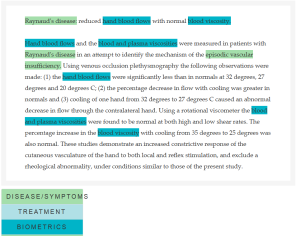How would thorough annotations improve information extraction from biomedical research literature? To illustrate one of the issues Mark2Cure aims to address, we’ll start with an example drawn from history–the undiscovered public knowledge that an information scientist named Don Swanson successfully mined in the 1980’s.
At that time, there were 2,000 research articles on Raynaud’s syndrome, a disease characterized by feelings of numbness and cold in some parts of the body in response to cold temperatures or stress. There were also about 1,000 research articles on fish oils, but there were no articles that spanned, joined, or linked both subjects.
In the case of Mark2Cure, citizen scientists will annotate abstracts of these research articles since the pace of research publication is much higher now than it was in the 1980’s.
Examples of Raynaud’s syndrome abstracts from the 1980’s annotated for disease/symptoms, treatments, and biometrics as it might appear via Mark2Cure

|

|
Examples of Fish Oil abstracts from the 1980’s annotated for disease/symptoms, treatments, and biometrics as it might appear via Mark2Cure

|

|
By annotating abstracts, citizen scientists enable researchers to link ideas from different fields of studies which can lead to new hypothesis. In Swanson’s case, the terms ‘red-blood cell (erythrocyte) deformability’, and ‘blood viscosity’ linked articles from these two fields of study which are otherwise usually considered independently. Swanson then hypothesized that Fish oil could be useful in treating the symptoms of Raynaud’s syndrome and his hypothesis was later tested by another group in 1988.
Although citizen scientists were not employed in Swanson’s case, the volume of biomedical research literature has ballooned since the 1980’s. Because no machine algorithm can currently annotate abstracts as well as a group of people, citizen scientists are critical to the success of Mark2cure in expediting scientific discovery in biomedical research.

